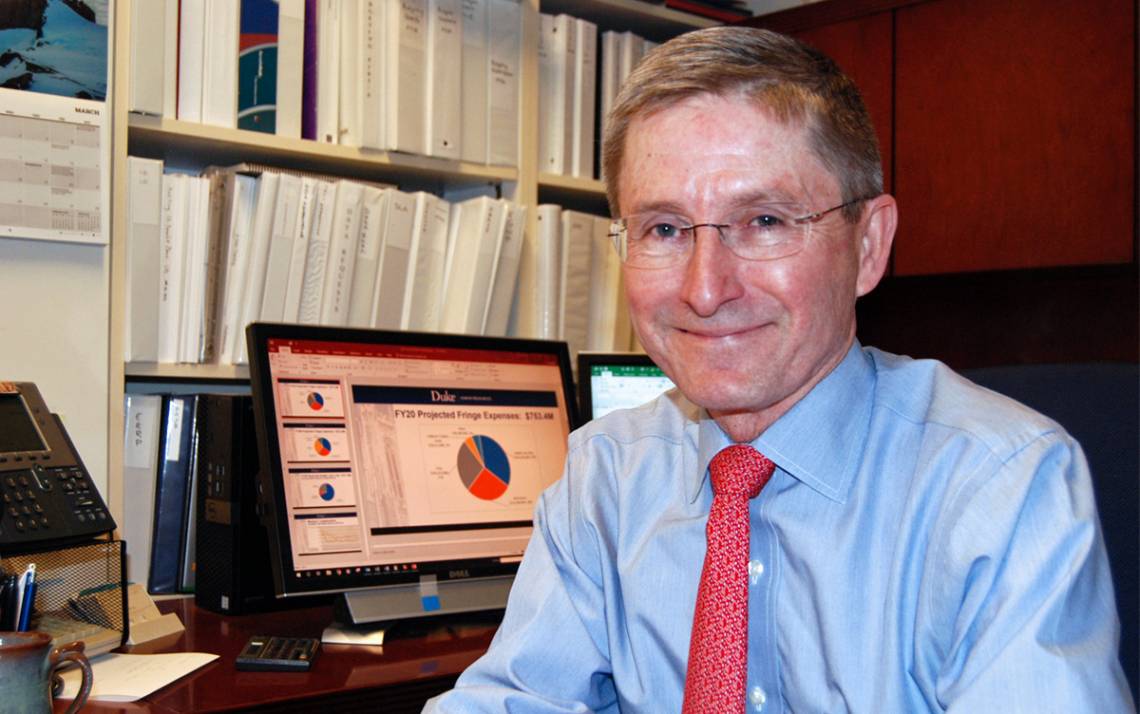Blue Devil of the Week: Crunching Some Important Duke Numbers
Chuck Hunter manages Financial Performance and Quality Assurance in Human Resources

Name: Chuck Hunter
Position: Manager, Financial Performance and Quality Assurance, Duke Human Resources
Years at Duke: 16
What he does Duke: As part of the annual Open Enrollment period for Duke medical, dental and vision benefits, eligible Duke staff and faculty receive information explaining coverage options for the upcoming year. Perhaps the most prominent piece of that information are the monthly premiums for Duke’s health insurance plans.
These figures are the result of a complicated analysis of past health care costs for people covered by Duke plans, projections for how many people will enroll and how much coverage they’ll need.
Chuck Hunter, with help from colleague Ashley Awad, is responsible for producing these numbers, a project he works on for about five months amid other undertakings.
“We look at utilization, price and population,” Hunter said. “We use those three components and come up with an estimate of what it’s going to cost us and then we do our best to keep the premium increases as small as possible. And I think we’ve done a pretty good job because we’re generally below the market.”
Hunter also analyzes Duke’s workforce data to produce reports for colleagues hoping to learn more about a specific area or government regulators checking compliance questions. He produces forecasts about employee benefits that help Duke leadership make key decisions and works with benefits vendors to keep costs down.
Lesson learned during the pandemic: Much of Hunter’s job is studying past trends to try to forecast what will come next. But when the COVID-19 pandemic presented uncharted territory for the health care system, it underscored how difficult predicting the future can be.
“I’ve learned a heaping measure of humility in that, what you think you understood, can get turned on its head,” Hunter said. “All of the trends that can seem so normal before can get upset by a something like a pandemic. So you just have to be humble when you make statements about “why this,’ or ‘why that.’”
What he loves about Duke: As part of his position, Hunter dives into Duke’s workforce data, which shows him how varied jobs are here. From brain surgeons to boatswain mates, Duke’s workforce includes a wide array of roles.
“From this birds’ eye view I’ve got, I get to see the variety of things that happen at Duke,” Hunter said. “It’s fascinating to see all of the different jobs and skill sets and try to come up with benefits to help the people here. It’s unique in that way. I’ve never worked at a place with such variety.”
 A special tool he uses: While Hunter does much of his work on spreadsheets, where’s he crafts detailed reports and plugs numbers into custom models, he’s rarely more than an arm’s length away from the HP-12C calculator he’s used since his days as a graduate student at North Carolina State University in the 1980s.
A special tool he uses: While Hunter does much of his work on spreadsheets, where’s he crafts detailed reports and plugs numbers into custom models, he’s rarely more than an arm’s length away from the HP-12C calculator he’s used since his days as a graduate student at North Carolina State University in the 1980s.
“They still make them, but they don’t make them as heavy duty,” Hunter said. “This one’s built like a little tank. I get laughed at during meetings because everybody else is using their cell phone or a tablet. That makes this thing look ancient, but I use it and I’m proud of it.”
First ever job: As a rapidly expanding city, it’s hard to picture parts of Charlotte as farmland. But growing up, Hunter’s family owned a dairy farm in the city’s southwest corner that produced milk, ice cream and other products for customers across the city.
From an early age, Hunter pitched in by cleaning stalls, milking and feeding cows and doing other odd jobs.
“I loved it,” Hunter said. “I worked there very summer and when I got old enough, I’d drive the trucks and deliver milk all over Charlotte.”
Something most people don’t know about him: In 1981, Hunter won a Fulbright Scholarship for an idea he had to study the dairy industry in New Zealand. That gave the recently-married Hunter a chance to spend a year in the ruggedly beautiful country, doing research.
While he was down there, his first child – his son, Sam – was born.
“I call him a Kiwi by birth,” Hunter said.
Is there a colleague at Duke who has an intriguing job or goes above and beyond to make a difference? Nominate that person for Blue Devil of the Week.